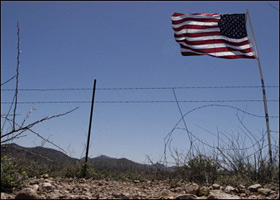 |
 |
 |
 Editorials | December 2005 Editorials | December 2005  
The Border - Dividing Line or Common Ground?
 David Bacon - SF Chronicle David Bacon - SF Chronicle


| | An American flag marks an opening in a barbed wire fence at the US-Mexico border. The House of Representatives voted to build a wall along the US border with Mexico to stop illegal immigration. (AFP/Nicholas Roberts) |
Immigration "reform" as touted in Washington is anything but. Emphasizing failed and dangerous enforcement policies, President Bush's proposal would greatly expand a growing form of corporate welfare - huge guest-worker programs - and would make no real change in the status of the 12 million people already in the United States who have no immigration documents.

Other congressional proposals are even more extreme. Rep. James Sensenbrenner, R-Wis., has put forward a bill, HR 4437, that would deprive immigrants of important due-process rights and drive the undocumented even further underground. Rep. Tom Tancredo, R-Colo., suggests mass deportations on a scale dwarfing the shameful roundups of Mexicans in the 1920s and '30s.

Fear of those proposals has caused some advocates to support a lesser-evil approach: a bill by Sens. Ted Kennedy, D-Mass., and John McCain, R-Ariz., that also calls for increased enforcement and a new guest-worker scheme.

It's time to look at the reality of current policies and design better alternatives.

- Reality check No. 1: People will come to the United States as long as economic inequality grows between rich and poor countries, even if the frontier between the United States and Mexico becomes an armed camp. More than 130 million people worldwide now live outside of the countries in which they were born, according to Migrant Rights International in Geneva. These migrants seek not to injure their new host countries, but to work and provide for their families.

- Reality check No. 2: The work of migrants is indispensable to many industries, from agriculture to construction. So is the work of people born here. Everyone needs a job.

- Reality check No. 3: Deporting or denying work to migrants does not create a single job for anyone else. In 1998, the AFL-CIO called for the repeal of employer sanctions, which prohibit the undocumented from holding a job. Employers use the law, unions argue, to push wages down and threaten those who demand workplace rights. When the prohibition was heavily enforced in Nebraska's meatpacking plants in 1998, union organizing was undermined and wages went down instead.

- Reality check No. 4: Beefed-up border enforcement doesn't deter people from crossing. It does, however, force migrants into the most remote and dangerous areas. As a result, hundreds die every year, according to both the Mexican and U.S. governments. More enforcement will simply lead to more exploitation and death.

Allowing corporations to contract for hundreds of thousands of temporary guest workers is no answer, however. From 1942 to 1964, hundreds of thousands of Mexican braceros were recruited for U.S. agribusiness. If they went on strike, they were deported; if resident farm workers tried to unionize, growers used braceros to replace them.

Today's guest-worker programs are just as abusive. Guest workers in today's farm labor programs who complain about illegal conditions are blacklisted. Contract workers in the Marianas Islands' garment factories were held as virtual slaves, according to a lawsuit filed by the Asian Law Caucus.

But the lure of cheap labor has led the Essential Worker Immigration Coalition (including Wal-Mart, Tyson Foods and other corporate giants) to insert guest-worker programs into almost every immigration-reform proposal. Some argue this will benefit migrants, but a choice between becoming a bracero and dying in the desert is no choice at all. Instead, many immigrant organizations call for a general immigration amnesty.

The last such amnesty was signed into law by President Ronald Reagan in 1986. It successfully led to legal status for more than 6 million people, who are now active members of our communities, many as citizens. But migrants who have come since 1986, like the workers in these photographs, face the same exploitative conditions, forced on them in part by lack of legal status. To corporate employers, those conditions are a source of profit.

A proposal similar to the 1986 amnesty has been introduced by Rep. Sheila Jackson Lee, D-Texas. It would legalize people already here and outlaw discrimination based on migrant status. Jackson Lee also believes federal policy should not pit migrants against the native-born in job competition, as do guest-worker programs. Her legislation would fund job training and creation in communities with high unemployment.

Instead of promoting a bitter fight over jobs, Congress should make reducing unemployment federal policy. People will still cross the border, looking for work. Increasing the number of green cards, or resident visas, would ease the pressure to cross illegally and give migrants a status more equal to everyone else. People could reunite families without waiting for decades.

Meanwhile, changing U.S. trade and economic policies abroad would decrease the pressure for migration. Treaties such as NAFTA promote poverty and low wages as incentives for corporate investment. Instead, the United States could help provide loans to keep small Mexican farmers on the land and stop cheap NAFTA-facilitated U.S. corn exports, which destroy their market. When U.S. policy promotes declining wages and unemployment in Mexico, where do we think those affected people will go?

People in Mexico and the United States need the same things: secure jobs at a living wage. Rights in our workplaces and communities. The freedom to travel and seek a better future for our families. The border should be a common ground between us, not a line to divide us.

David Bacon, a reporter and photographer who specializes in labor issues, is author of "The Children of NAFTA" (University of California Press, 2004). | 
 | |
 |



